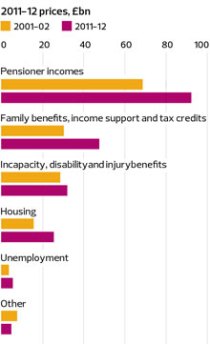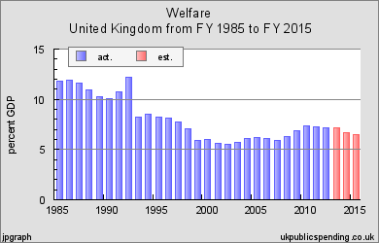
In recent times the UK has begun suffering with a somewhat benefits and immigration neurosis. It seems that since 2009 any group seen to be taking from the state undeservedly is now a target. What started as a media fueled obsession has now been set ablaze by the government. Wide ranging reforms have been made to the welfare state and immigration, all due to the fear that someone might be getting something for nothing. However as always the situation is blown up to proportions which scarcely resemble the reality. To show this lets start with the issue of benefits.
Britain’s ‘scroungers’ and the Dependency CultureRecently the word ‘scrounger’ has been creeping evermore into the media. The Sun for example launched its campaign to ‘Stop the £1.5 billion benefits scroungers‘ whilst the daily mail is never hesitant to remind us that there is a family with 10 kids living nearby claiming your hard earned tax money. Dealing with the general public I hear the complaints day in day out, anyone who diverges from this attitude is also generally targeted as I found out in a recent debate with a customer in my store. In a joint report by Elizabeth Finncare and the University of Kent, the paper found that attitudes have charged in the last 20 years towards claimants with more people viewing claimants as undeserving – this is backed up by the British Social Attitudes survey which find that 62% of people believe that unemployment benefits are too high and discourage work. In addition the paper also found that the usage of negative vocabulary, such as scrounger, in media articles has increased since the recession.
So what is the reality. Well firstly, as the Prime Minister is all too happy to remind us, we are spending more than ever on welfare. As the graph below, from the guardian, shows the welfare bill has increased in nearly all areas in period 2011-12 compared to 2001-02.
Graph 1. Total Welfare Spending by type

Source: The Guardian
This is a fact a lot of the media would like to cling to. The Sun for instance has taken pleasure in proclaiming ‘benefits have increased 20% in the last 5 years’ whilst the daily mail has cried out that benefit spending has rose by 60% since 1997/98. With such exclamations one could not be forgiven for believing that the increase in spending on welfare is the result of a long term upward trend.
Graph 2
However as the graph above shows, when welfare spending is viewed as a proportion of GDP, the story changes. For instance in the late 1980s and early 1990s the proportion of GDP spent on welfare was over 10%. Since then it has come down to a more manageable level, with a recent increase from 2008 on wards. Why? Well recessions are a underlying cause of unemployment and unemployment means more claimants! So much for the usual George Osborne mantra of a ‘welfare state we cannot afford’.
In addition, when we measure the share of welfare paid out as unemployment benefit (% GDP) we find that the UK ranks the third lowest in Europe at 1.13%. Only Italy and Slovakia rank lower whilst Denmark ranks highest at 6.83%.
Even more so when we look at the rising cost of welfare in nominal terms (see graph 1) we see that it is the rising number of pensioners which has added the most to the welfare bill not the unemployed. But hang on what about all those families who feed off the state with up to 5 or more dependent children? What about Mick Philpott and his 17 children, doesn’t this bring into question the welfare state? Isn’t the welfare state encouraging those receiving benefits to have more children and become ever dependent? The data says otherwise.
In truth this is a very small problem, as the Economist explains in 2011 there were only 130 families with over ten children claiming at least one form of out-of-work benefit. Similarly only 8% of claimants had 3 children or more. The Economist then goes on to declare that current evidence shows that on average unemployed people have similar numbers of children compared to those who are employed – dispelling the myth that benefits encourage large families! In addition to this the Joseph Rowntree foundation has found that benefits do not encourage inter generational claimants.
If more evidence is needed that Britain’s ‘dependency culture’ is overstated, then take a look at a recent study by the government department for work and pensions. In a sample of 32-33 year olds who had claimed job seekers allowance (JSA) in 2010-11, over 40% had not made a claim in the previous four years. Furthermore 63% of the sample had not claimed JSA for a period of more than 6 months in those previous 4 years. This again challenges the common perception that many claimants are ultimately dependent on JSA and are part of a ‘dependency culture’.
Britain and the soft touch myth on immigration
This brings me onto the next issue of immigration and the common perception that most immigrants flock to the UK for its generous welfare system whilst giving nothing in return. In a number of key speeches David Cameron has vowed to crack down on the problem and shed the UK’s image as being a soft touch. But how serious is the problem and what would happen is we cut net immigration to zero (A recent YouGov poll found 64% of UK participants in the study wanted net immigration reduced to 0%).
Firstly it should be noted that economically, a majority of studies agree that immigrants are a benefit to the UK. For instance a recent OECD report found that immigrants make a net contribution equivalent to 1.02% of GDP or £16.3 billion. This is because the majority tend to be of working age and are therefore more economically active. Moreover the Office of Budget Responsibility (OBR) predicts that if net immigration was reduced to zero, public sector debt would rise by £18 billion in the next five years. Increase this time span to 50 years and by 2062-63 the OBR predicts that net debt to GDP ratio could increase to 174%. To put this in perspective Greece’s current level of national debt is 161% .*
Okay but what about the benefits these immigrants claim I hear you ask. Isn’t Britain turning into a prime location for welfare tourism? A commonly cited report by the government Department for Work and Pensions (DWP) claims that there are 371,000 immigrants claiming benefits from the state. Chris Grayling, the employment minister, has also used this statistic to highlight the issue of benefit tourism, arguing in a article that Labour basically opened the doors to such problems. Naturally before the study was properly analysed the media pounced on the story with papers such as the daily telegraph headlining, ’370,000 migrants on the dole’.
In fact due to the statistical method used this number highlighted by many should be at least half of what is reported*. As the DWP explicitly points out, the study shows;
This means that the number includes migrants who may have emigrated to the UK decades ago, worked, subsequently claimed UK citizenship and unfortunately now find themselves claiming benefits. In fact the DWP estimates that 54% of the ’370,000 migrants on the dole’ are actually UK citizens! Furthermore the report shows that the number of migrants claiming benefits unlawfully or fiddling the system is as low as 2%. This equates to 7,500 people out of a total 5.5 million people supported by the state. Not as much of a problem as many would like us to believe.These statistics do not provide a measure of non-UK nationals currently claiming benefits based on their current nationality. The statistics do provide an estimate of the number of people currently claiming benefit who, when they first registered for a NINo (that is, first entered the labour market), were non-UK nationals. (pg. 4)
A more useful overview of the situation is provided by economist Jonathan Portes of the National Institute of Economic and Social Research. In his post he uses the data compiled by the DWP and the ONS Labour Force Survey to summarize the extent of migrant claimants in the UK. He shows that:
- migrants represent about 13% of all workers, but only 7% percent of out-of-work claimants;
- migrants from outside the European Economic Area (EEA) represent about 9-10% of all workers, but about 5% of out-of-work claimants
- foreign nationals from outside the EEA represent about 4.5% of all workers, but a little over 2% of out-of-work benefit claimants.
When such claimant figures are compared to those from the native population the story changes. It turns out that migrants are much less likely to claim benefits than us Brits. This again is explicitly highlighted in DWP study which explains;
As at February 2011, 16.6% of working age UK nationals were claiming a DWP working age benefit compared to 6.6% of working age non-UK nationals.Yet again this challenges the misconceptions held about immigrants who come to the UK. More importantly, it should be questioned as to why some of our most read newspapers and senior ministers failed to highlight this.
Two closely linked issues
So what does it all mean then. To me it seems like these two issues are closely interlinked. Morally many individuals never like to see others getting something for nothing. Such feelings may also be at their strongest when nominal wages are stagnant and the cost of living is increasing – the recent YouGov polls are a testament to this. Naturally it is those at the margins that are targeted, in this case those who have lost their jobs or have recently migrated to the UK.
It seems the government has tried its utmost capitalize on this national sense of insecurity. After all reducing the size of the state is a principle goal of the conservative right. Despite this the other main political parties have also pandered to public opinion with Ed Miliband declaring his intention to tackle low skilled immigration. In some sense this brings into question the idea of an informed electorate, if people were aware of the true extent of these issues would the opinion be so in favor of targeting those on the margins. Just one example of this can be seen from a revised YouGov poll (Yes I know YouGov again!) which shows when individuals are informed of the benefits of immigration their opposition to it drops. It would be interesting to see if same was true for those claiming unemployment benefits.
*It should be noted however that the OBR research makes some key assumptions. For instance it assumes immigrants tend to arrive at working age and therefore don’t require state funded education in early life. As a result they tend to make a net tax contribution until old age where they may be more inclined to return home. There is also some disagreement on whether the children of such migrants should be classified as natives – read the study for further details.
*The statistics used in the study were compiled by matching data from those who had applied for a National Insurance number with data from individuals currently claiming working age benefits. The study, as the DWP declares, therefore shows;